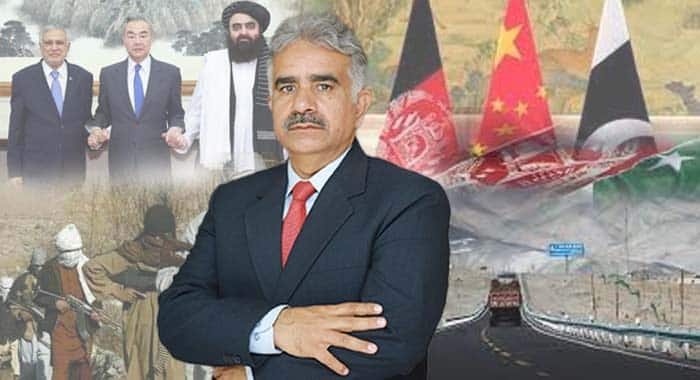The recent trilateral dialogue, in Kabul, between Pakistan, China, and Afghanistan marked yet another critical moment for the region’s future, particularly whether Afghanistan is ready to shift from decades of conflict to economic cooperation. Held in Kabul, the meeting centred on connectivity, counterterrorism, and development, with the long-term vision of integrating Afghanistan into the China-Pakistan Economic Corridor (CPEC) and other regional projects like CASA-1000, TAPI, and the Mazar-e-Sharif–Landikotal railway link.
But the question remains: Can the Islamic Emirate deliver on the commitments it keeps making, especially its pledge that Afghan soil will not be used against neighbouring states?
Taliban Foreign Minister Amir Khan Muttaqi gave a familiar assurance in Kabul: no militant group would be allowed to operate from Afghan territory against any other country. It’s a statement we’ve heard repeatedly since the Taliban takeover in 2021. Yet, reports from both UN monitors and regional intelligence agencies paint a different picture.
The banned Tehreek-e-Taliban Pakistan (TTP), the Baloch Liberation Army (BLA), the Baloch Nationalist Army (BNA), IS-Khorasan Province (IS-KP), and the Turkestan Islamic Party (TIP) are all said to be operating with varying degrees of freedom within Afghanistan’s borders. Pakistan and China have both shared intelligence and even submitted lists of wanted militants; some with video evidence, GPS coordinates, and details of training camps in Nuristan, Kunar, Paktia, Paktika, and Khost.
A report recently cited in national media claims that the family of TTP leader Mufti Noor Wali Mehsud receives $43,000 monthly; funds allegedly used to buy weapons and explosives for attacks on Pakistani soil. If this is accurate, it not only undermines Taliban claims of non-interference but raises the alarming possibility of official or unofficial financial support for anti-Pakistan elements.
This is a defining moment for the Islamic Emirate. Either it chooses development, trade, and recognition, or it continues to harbour and tolerate groups whose actions threaten regional peace. The Emirate can no longer straddle both worlds. Hiding behind cultural codes like Pashtunwali, or invoking religious brotherhood as an excuse for inaction, won’t work anymore.
Both Pakistan and China are clear: if Kabul truly wants to join initiatives like CPEC, or attract meaningful foreign investment, its territory must not be a sanctuary for terrorism.
The consequences of continued militancy are dire; not just for Pakistan, but for Afghanistan itself. Development in Balochistan and Khyber Pakhtunkhwa remains hampered due to attacks on infrastructure and security forces. Foreign investment dries up in such environments. If Pakistan’s western provinces are destabilised, how can Islamabad justify expanding economic ties westward into Afghanistan?
Likewise, China’s interests in mineral extraction and trade routes via Afghanistan will remain under threat unless groups like TIP are dismantled. The presence of Uighur militants in Afghanistan is of strategic concern for Beijing, which has already submitted detailed dossiers on their networks. China’s cautious stance reflects the seriousness of this issue.
There are credible signs of a divide within the Taliban itself. While leaders like Siraj-ud-Din Haqqani are seen as pragmatic and open to regional cooperation, hardliners within the group remain sympathetic to or even aligned with transnational jihadist movements. These internal fractures prevent a unified policy response, and allow non-state actors to operate in the shadows.
The Taliban’s senior leadership must now answer a crucial question: Is the pursuit of economic progress more important than ideological loyalties? They cannot have both.
Pakistan has suffered immensely, losing over 87,000 lives to terrorism. It bore the brunt of the West’s war in Afghanistan and is now paying the price for regional instability. Any further cooperation with Kabul will be conditional on firm and visible action against militant groups.
Islamabad has made it clear: if terror groups are allowed to flourish in Afghan territory, there can be no trade, no transit, and no development partnership. CPEC’s expansion into Afghanistan hinges directly on security guarantees.
Despite all this, the door isn’t closed. Afghanistan still has a chance to choose the path of progress. If it acts decisively; by dismantling terror camps, ending financial support to extremist groups, and showing clear political will, then not only will CPEC expand into Afghan territory, but a new era of regional prosperity could begin.
But the time to decide is now.
The Islamic Emirate must weigh its options: continue providing space and resources to armed groups, or step into the future with its neighbours as a trade partner, not a security threat.
As regional dynamics shift and economic proxy wars loom, Pakistan remains the region’s centre of gravity. If there’s to be peace, growth, and stability, it must begin with firm decisions in Kabul.





